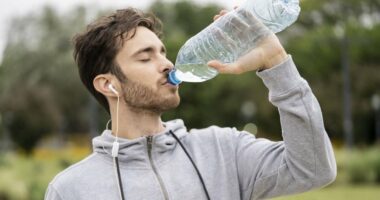Share this @internewscast.com
Researchers are praising a beloved winter beverage for its potential to improve men’s heart health, especially for those who spend long hours sitting. It’s well-documented that many young adults are sedentary for about six hours daily, often at desks or while commuting, which can impede blood flow and increase the risk of heart disease and stroke.
A recent study conducted by the University of Birmingham suggests that sipping hot chocolate before prolonged periods of sitting could protect the arteries. This benefit is attributed to flavanols, natural compounds found in cocoa, tea, and berries, known for promoting cardiovascular health. The research involved 40 healthy young men, split into two groups based on physical fitness. Participants consumed cocoa drinks either rich in flavanols (at least 695mg) or with minimal flavanol content (5.6mg) before sitting for two hours. The team then measured arterial elasticity, blood pressure, and oxygen levels in their leg muscles.
Following the consumption of the low-flavanol drink, both groups experienced reduced artery function and increased blood pressure. However, those who drank the high-flavanol cocoa maintained optimal artery performance.
Published in the Journal of Physiology, this study is groundbreaking in demonstrating that flavanols can counteract the decline in blood vessel function typically associated with prolonged sitting.
Dr. Catarina Rendeiro, an Assistant Professor in Nutritional Sciences at the University of Birmingham and the study’s lead author, commented on the findings: “Whether at desks, in cars, on trains, or relaxing on the sofa with a book or watching TV, we all spend considerable time seated.”
Dr Catarina Rendeiro, Assistant Professor in Nutritional Sciences at the University of Birmingham, and leading author, said: “Whether we are sitting at desks, behind the wheel of a car, on a train, or on the sofa reading a book or watching TV, we all spend a lot of time seated.
“Even though we are not moving our bodies, we are still putting them under stress.
“Finding ways to mitigate the impact that sitting for uninterrupted periods has on our vascular system could help us cut the risk of developing cardiovascular diseases.”
Deaths of cardiovascular disease are on the rise; the British Heart Foundation reports that deaths of working-aged adults in the UK increased by 18 percent to 21,975 in 2023, compared to 2019.
In addition, recent studies have found that cardiovascular diseases cost the UK an estimated £29 billion.
Flavanols are a type of polyphenol compound that occur naturally in some fruits, tea, and nuts, and cocoa beans.
They have been shown to have cardiovascular health benefits, such as protecting the vascular system during periods of mental stress.
Previous studies have shown that a 1 percent reduction in vascular function – as measured by brachial Flow-mediated dilatation (FMD) which measures the elasticity of the arteries – leads to a 13 percent increased risk of cardiovascular disease such as heart disease, strokes, and heart attacks.
The researchers wanted to explore if there was a way that diet, particularly foods that are high in flavanols, could help protect against the risk to our vascular system associated with periods of uninterrupted sitting.
The study results found both the men’s lower and higher fitness groups who had the low-flavanol cocoa before sitting, experienced FMD declines in the arteries in their arms and legs.
This suggests that higher levels of fitness do not provide protection from sitting. It also significantly increased diastolic blood pressure, decreased shear rate and blood flow in both arteries, and resulted in declines in muscle oxygenation in both fitness groups.
However, the research found that those groups who consumed the high-flavanol cocoa drink, again in both fitness groups, did not experience FMD declines in either of the arteries in their arms or legs.
This is the first time flavanols have been shown to be effective at preventing sitting-induced vascular dysfunction, in young healthy men.
Dr Sam Lucas, Professor of Cerebrovascular, Exercise & Environmental Physiology at the University of Birmingham and co-author of the study, said: “Our experiment indicates that higher fitness levels do not prevent the temporary impairment of vascular function induced by sitting when only drinking low-flavanol cocoa.
“Importantly, after the high-flavanol drink, both fitter and less-fit participants kept their FMD the same as it was before sitting for two hours.”
The study therefore found that all individuals can benefit from flavanol intake, regardless of their levels of physical fitness.
Alessio Daniele, PhD student from the University of Birmingham, added: “It is actually quite easy to add high flavanol foods to your diet.
“There are cocoa products available in supermarkets and health stores which are processed through methods that preserve flavanol levels.
“If cocoa isn’t your thing, fruits like apples, plums and berries, nuts, and black and green tea are all common kitchen staples and are readily available.”
University of Birmingham researchers did not do their study with women, as changes in oestrogen levels during the menstrual cycle are suspected to affect the impact of flavanols on vascular health during sitting – although they say this “should be the focus of another future trial.”
Dr Catarina Rendeiro concluded: “Our research shows that consuming high-flavanol foods and drinks during periods spent sitting down is a good way to reduce some of the impact of inactivity on the vascular system.
“Given how common sedentary lifestyles have become and the increased risk this can have to vascular health, using flavanol-rich food and drink, especially in combination with breaking up periods of inactivity by going for a short walk or standing up, could be a good way to enhance long-term health, no matter the individual’s fitness level.”














